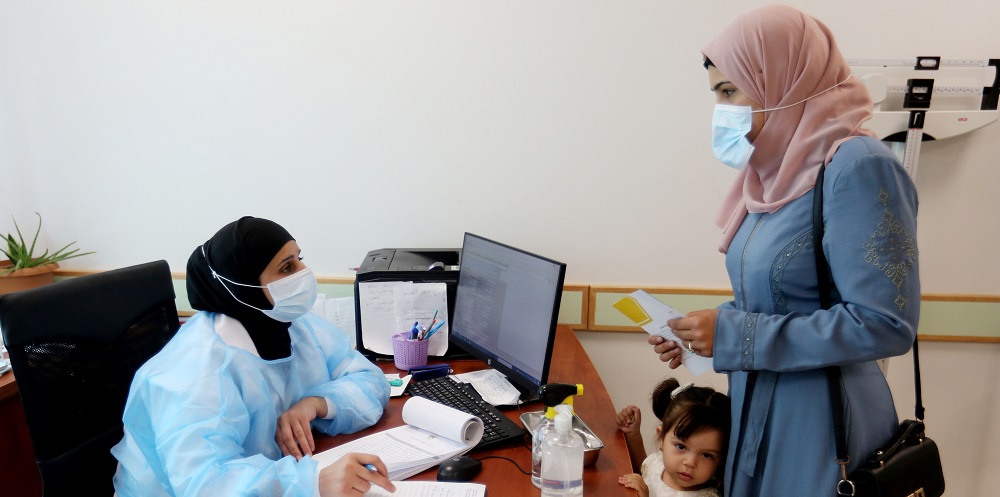 Tamam Taha, a nurse at the Biddo UNRWA health facility, greets a mother at the campaign registration desk
Tamam Taha, a nurse at the Biddo UNRWA health facility, greets a mother at the campaign registration desk
24 May 2022 – Over 16-19 May, parents in the governorates of Bethlehem and Jerusalem were urged to take their children under 5 to health facilities for a supplementary dose of bivalent oral polio vaccine (bOPV) with the aim of boosting their immunity against poliovirus in the face increased regional risk.
Unlike most polio campaigns in the Eastern Mediterranean Region, the mechanism for the campaign in occupied Palestinian territory (oPt) was via health facilities, rather than house to house.
Round 1 tested the resolve of a community that is famously pro-vaccine (routine immunization coverage across oPt is typically between 98% and 100%), but like everywhere, parents are juggling work, childcare and other commitments.
In Biddo, an area of Jerusalem governorate where the main UNRWA clinic serves both local families and those from more remote regions, a steady stream of clinic visitors climbed out of mini-buses and taxis after lengthy journeys.
“Many Bedouins come to us from remote areas like Bani Samuel and Beit Iksa, although the transportation from their areas is very hard for 2 reasons. First, the roads are very difficult, and second, there are a lot of checkpoints that could keep you waiting for hours,” said nurse Tamam Taha.
In some cases, the hurdles parents faced to bring their children to health facilities were starkly visible.
Nidal Kandeel, father of 3-year-old Janette and 21-month-old Jolan, arrived at Biddo UNRWA health facility on crutches.
“I got an injury in my work a year ago, and I’m now disabled for the rest of my life. It was hard for me to come to the clinic using public transportation, but I know how important it is for my children to take the polio vaccine, and this is why I am here,” he said.
Following the campaign at health facilities, nursing teams will review registers of children vaccinated and cross-reference these with patient lists. Parents of children who weren’t vaccinated will be telephoned and efforts made to reach those children through in-clinic follow-up or outreach.
Round 2 is expected in mid to late June, with the aim of raising immunity levels in these 2 governorates.
Palestine has been polio-free for more than 25 years, thanks to a robust routine immunization programme and a strong culture of vaccine acceptance. But following the detection of circulating vaccine-derived poliovirus type 3 (cVDPV3) in sewage outflow coming from inside the green line with wastewater coming from Bethlehem and Jerusalem, the Palestinian Ministry of Health launched efforts to boost immunity in the areas deemed most at risk.
The campaign was carried out with support from WHO, UNICEF and UNRWA’s Palestine country offices.
WHO’s Palestine office provided technical support to the Ministry in planning and executing this campaign, drawing on the extensive expertise of our regional polio eradication programme.


